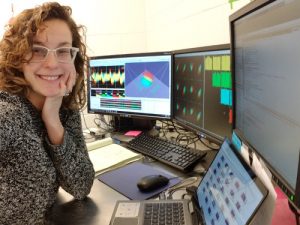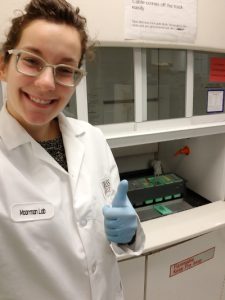Four years ago, I graduated from UConn with a Bachelor of Science in Developmental Neuropsychology. My plan of study included courses ranging from molecular biology of the brain to child and family development. I participated in multiple research projects, including one at a clinical neuroscience laboratory, with Dr. Deb Fine, studying autism spectrum disorders, and, because I wanted to know more about the science behind the clinical diagnosis, one at a behavioral neuroscience laboratory. My final research project, in the laboratory of Dr. R. Holly Fitch, explored the neuroanatomical effects of a candidate dyslexia gene in female and male rats. I presented this work at both the Frontiers of Undergraduate Research and the Behavioral Neuroscience Seminar Series in 2014.

I am currently a graduate student in the neuroscience program at the University of Massachusetts Amherst. Neuroscience is an interdisciplinary field, combining biology, chemistry, and psychology, and our program requires us to understand it from each of these perspectives. As an individualized major, I was already prepared for these topics! In my current work, I examine how positive and negative stimuli affect learning in an animal model. I am also responsible for teaching a wide range of classes from Physiology to Writing for Psychologists. I have presented my work at a conference organized by the Society for Neuroscience in Washington D.C. and have traveled to San Diego and Chicago for other conferences organized by them. One of my favorite activities in graduate school has been my work with Girls Inc., a program that, among many other things, endeavors to keep teenage girls interested in science. I run multiple neuroscience lab days throughout the year to reach out to these young scientists. I am focused on helping other young students to find their way in academia, as the individualized major helped me to do.

Although graduate school is challenging in many ways, I truly feel that the individualized major prepared me for it. The process of doing laboratory research, writing a thesis, and presenting my work helped me to focus on the scientific questions that I will explore during my career. And having an individualized major was an integral part of my acceptance to the doctoral program. The self-designed course of study helped my application stand out among the traditional majors and it illustrated my commitment to the field beyond the laboratory and the classroom. I am not sure where I will be after graduate school, but I can be sure of one thing: I will be in the field of neuroscience. And it is all thanks to my time in the individualized major program at UConn.
By Beata Kaminska-Kordowska
IMJR: Developmental Neuropsychology